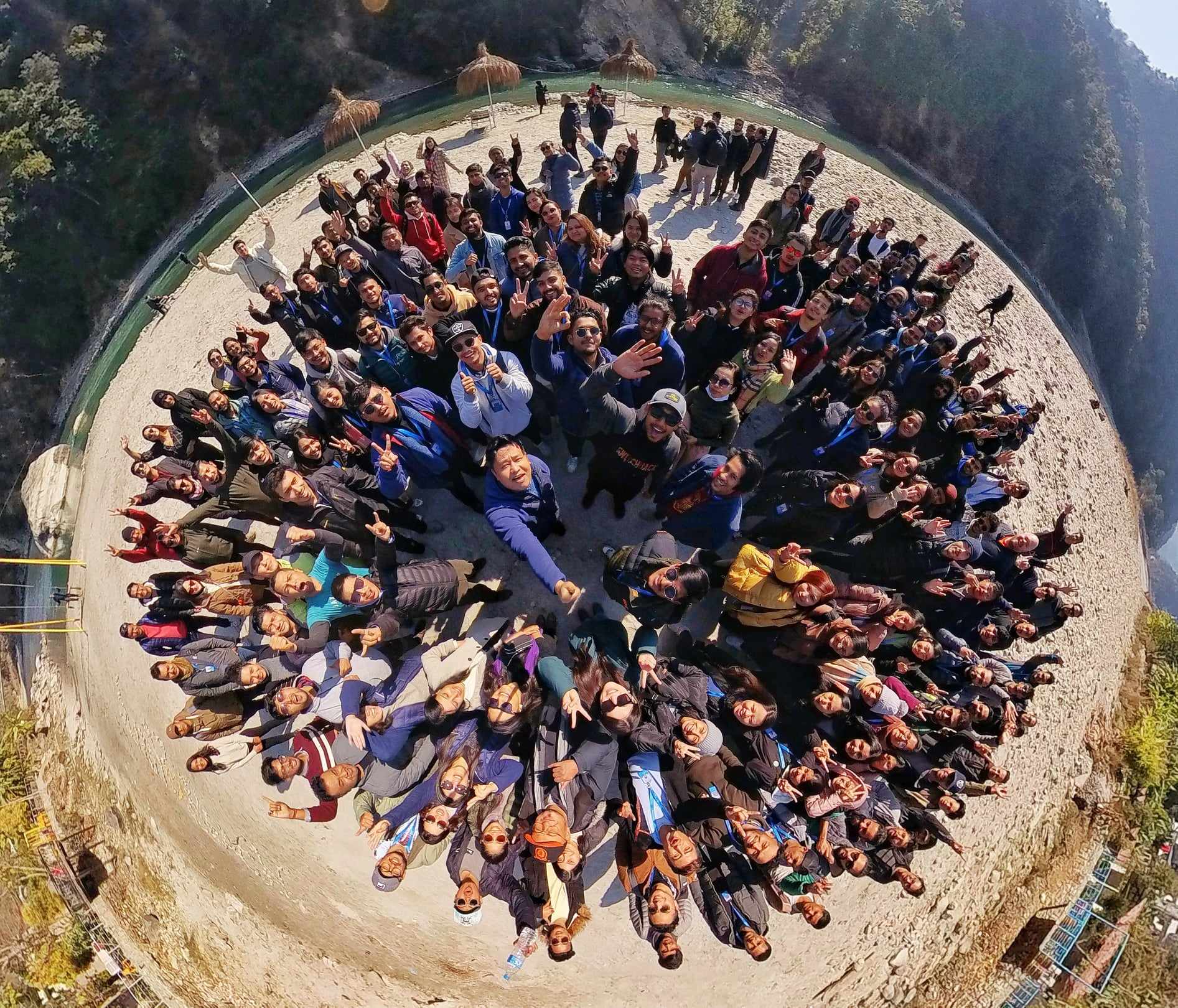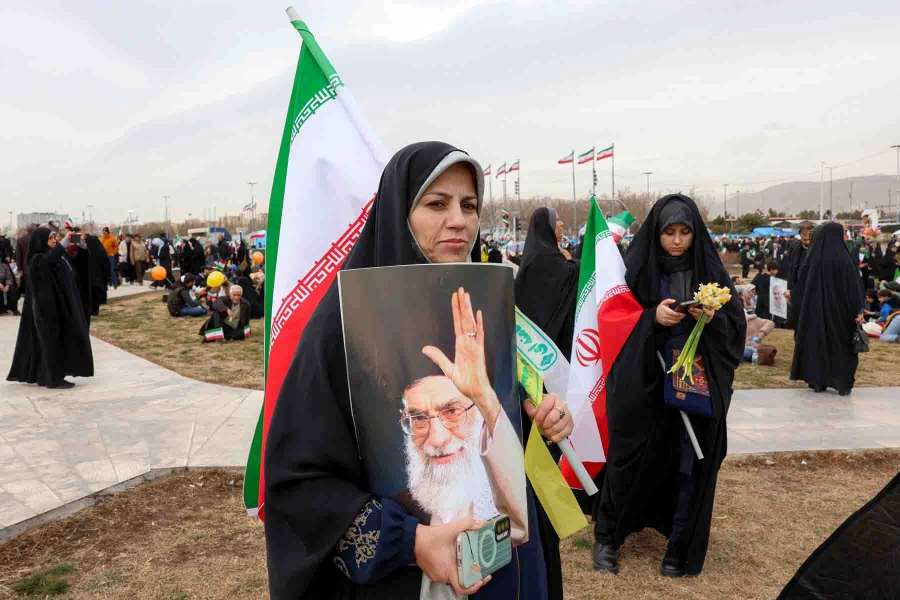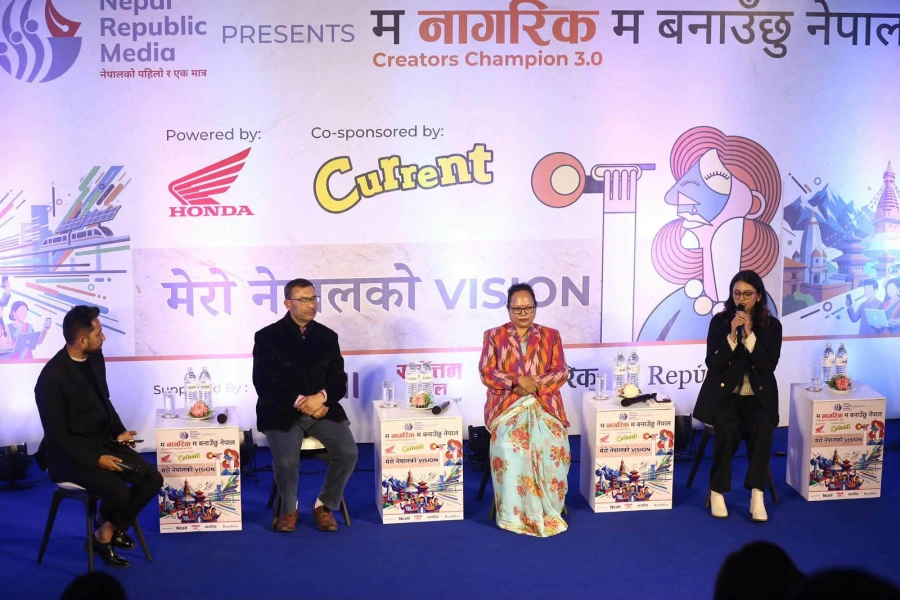"AI education should reach every corner of Nepal"
Fusemachines, a company established by a Nepali-origin entrepreneur working in the field of Artificial Intelligence (AI) Dr Sameer Maskey, is poised to make history by becoming the first company led by a Nepali origin entrepreneur to be listed on the esteemed US stock exchange NASDAQ. Dr Maskey, who holds a PhD in computer science from the renowned Columbia University, established the company in 2013. The company headquartered in New York now has operations spanning Asia, Canada, the USA, and Latin America. Also an adjunct faculty member at Columbia University, Dr Maskey recently sat down with Republica's editor, Kosh Raj Koirala, for a Zoom interview, delving into his entrepreneurial journey, recent achievements, challenges faced, and future plans. Excerpts:
How do you want to introduce yourself to Nepali citizens? How do you remember the journey from Nepal to America?
I grew up in Thamel, Kathmandu. I studied at Buddha Pre-Primary School in Thamel and then studied at St Xavier's from class one to ten. Then, I studied science with a biology major at Birendra Sainik College. During this time, towards the end of I.Sc Second year, I applied to various colleges and received scholarships from four to five colleges in the US.
With the help of this scholarship, I came to Bates College in the US and did my undergraduate in Mathematics and Physics. During this period, I did a lot of research on AI. I did research in the field of 'Nepali-to-English speech translation'. At the beginning of my fourth year of college, I applied for a PhD. Then I completed my PhD in five years from Columbia University. I briefly worked with IBM. Leaving behind everything, I returned to Columbia University again to pursue a teaching career.
Someone who pursued biology at the Intermediate level may have considered a career in medicine. What led you to your current path?
In Nepal, parents want their children to be a doctor or an engineer. Every parent has the same desire. So, I also studied biology. I had done well in it as well. I even passed the scholarship examinations conducted by the Ministry of Education to pursue medicine. While the path for me to study medicine under scholarship was already clear, I had at the same time received scholarships to pursue further study in the US. I was in a dilemma for sometime as my parents wanted me to become a doctor. I also wanted to be a doctor. However, the desire to work in the field of AI was overwhelming, although there was not much talk about computer science in Nepal during those days.
There was hardly any internet service in Nepal. A movie on AI instilled my desire to learn about it. In the USA too, I initially studied biomedical engineering. Biomedical engineering covers everything in the health sector. However, while studying, I grew more interested in computer science and AI, which paved the way for me to shift to this field.
What inspired you to name your company 'Fusemachines'?
This name came to mind in the year 2013 when I was thinking of a name for the company I wanted to establish. Initially, I contemplated names like 'Fusing Machines with Humans' or 'Fusing Machines into People's Lives,' reflecting the idea of integrating machines with humans. Eventually, I settled on 'Fusemachines' as a shorter and more concise alternative.
What was the main purpose of establishing the company?
I established the company thinking about how the use of machines could make our lives easier. It started with this. Initially, we made a machine called the 'Natural Language Dialogue System' for humans. However, due to millions of incoming calls, people had been forced to wait, often being put on hold for 20 to 40 minutes. To address this issue, we introduced the first conversational AI machine in a call center. Thus, we came up with how to use the first chatbot in a call center so that if anyone had a question, the machine would automatically respond. This is how we started initially.
How much was your initial investment? How did you secure the funding?
Capital management is the most difficult part of starting any company. The person investing in your company should have faith that you will not lose their investment and that your company can achieve something. I raised the initial investment for my company from my close ones including my family members. This is because no one believes you more than your family and friends. Only family and friends know about your struggle. That's why they stand ready to give you some capital, even if there is a risk involved in it. It is the same everywhere. It's the same in the USA as well. So, initially I raised some capital from my friends and started my venture.
Two-day Huawei Digital Nepal Conclave 2022

What is easy in the US is that when the initial capital starts to get better then the product will also start getting better. The capital can be increased if you can convince the investors that your company can achieve something. However, this kind of situation has not yet been created in Nepal, although, of course, some progress is being made lately in this regard.
In Nepal, ‘Fusemachines’ is generally understood as virtual classroom platforms that you created during the COVID-19 pandemic. What are other products or services that your company is providing?
Currently, we have primarily established ourselves as an AI studio. We've developed AI Engines Studio to address key industry challenges. To this end, we have created essential engines for tasks such as fraud detection, information extraction systems and other types of prediction systems. These are available for use by various companies, if they want.
This initiative has positioned us within the product sector. Additionally, we are active in another service sector, where clients’ needs for engines in the service area are met. Should these engines become unusable, our team of talented engineers works on resolving the issues using AI Studio. Specifically, we offer products and solutions related to AI.
What do you think is the secret behind the success you have achieved?
Our venture started with two tables in a small room of my sister's house in Anamnagar. Now, there are offices in New York, Nepal, Canada, and other countries. We received various kinds of help at different times. However, to reach this level, we were always focused more on value creation than generating money. Instead of chasing for money, we went for creating value for the company.
The support of friends and families is important for the success of the company. My mother, my sister, and my wife have been my biggest supporters. At times, I had also thought about giving up due to extreme difficulties. The support of your family is important during such stressful times. My mother, wife, and sister contributed the most during such moments. I still get help from my family. Apart from that, there are also other supporting organizations and they also have an important contribution to our success.
When you started this venture in a small room in Anamnagar a decade ago, did you ever think that your company would make it to the NASDAQ?
Honestly, I didn't think that. Of course, every entrepreneur has such a dream. But I never thought about it. I had a belief that the company would have a certain level of size in terms of value creation and it would go a bit further. But I did not think that the company would get this big. You may or may not achieve success. The key is you should be able to enjoy your journey when you choose to become an entrepreneur. So, my focus on my entrepreneurial journey right from the beginning was how to create value and how to leave its impacts. If one can influence it, everything will fall into place. Initially, I didn't think about making the company big or earning money. As an AI researcher with a PhD in AI, I dedicated myself to teaching and exploring what I could contribute to the AI sector to make a significant impact in society.
What do you suggest to youth entrepreneurs who have established or are planning to establish start-ups?
If you have the will to start a startup, you'll find a way. Many people keep making excuses and wait for the perfect time, which never comes. It's about having the determination to do it rather than just thinking about it.
Many young people think about earning a lot of money in the initial phase. Starting any new venture is always challenging, and there will be ups and downs. Family support and assistance from friends are also necessary. The most difficult part of any entrepreneurial journey is value creation. You know your purpose clearly, but others may not. What you feel about your brand, others may not feel the same way. Therefore, you need to pay more attention to the value creation of your brand.
The size of the workforce in your company has already grown significantly. What is the ratio of Nepali and foreign workers in your company? What kinds of differences have you observed between Nepali and foreign workers?
Our workforce is about to reach 500. There are as many as 300 individuals in Nepal, and the rest are in Latin America, the US and Canada. There is a similarity, but there are also certain differences. Everyone is equally hard-working, and they are highly involved in creating products and sales.
However, there are certain cultural differences. There are differences in culture between the US, Latin America, and Nepal. Managing cultural differences and integrating them into work is a challenge.

Team Fusemachines
Lately, there are also discourses about Artificial General Intelligence (AGI)? Can you help explain the difference between AI and AGI in simple terms so that even a layman can understand?
AI refers to software machines that take information– be it in the form of voice, speech, or written text– processes that information, and generates results. If those generated results are useful for humans or us, then it is called AI in general. For example, Tesla cars have implemented a self-driving system. It's a good example of AI. In this, there is information from radar and video feed about stop signs, and based on this, the machine makes decisions like when to jam brakes for the stop sign. This benefits humans as machines automatically drive the car.
But there is a new concept called AGI. AI can do almost anything like a human brain if it is based on other's input. AI works accordingly after receiving information about radar and stop, while AGI can work in such a way that it can take an immediate decision even if there is no prior information. However, AGI is still in the process of research.
Can you share with us key milestones that led to this significant achievement for your company?
The journey started at full pace in 2013. After leaving the IBM Thomas J. Watson Research Center, I pursued my studies in Columbia, and then, intending to start a company, I advanced further. The first success came within 20 days. While staying in the university's apartment, I developed the first system, a natural language dialogue system, writing several lines of words. After that, I raised a little more capital from friends. Then, in 2013, we achieved significant success, securing the New York City government as a client. That project proved to be highly impactful, and based on its success, we further increased our capital in 2014. We continued to develop our products; they even won many competitions. We maintained our client relationship with the New York City government, successfully created new products, and achieved sales.
We thought if we are able to sell our products to New York City there should not be any difficulty to sell the products and services to other clients. So, we did not hire good manpower. Therefore, we had to struggle for the next three years. During that period of struggle, we developed various products. It was during the same period we started developing and selling automation platforms. It started yielding good income.
During that same period, we initiated the Service Unit. The Service Unit was established to assist clients in developing AI systems. As we built this unit, our growth expanded significantly. We won the trust of crucial clients in this process. We also increased the capital. A number of investors also provided us with capital. The development progressed. Soon after that, we started introducing the old products to the market. We also built an AI studio.
How do you plan to utilize the approximately US$ 20 million infusion for working capital in your company?
The valuation of the company has reached $200 million as per the agreed merger with CSLM. It is not that we will receive an additional 200 million dollar fund. In connection with the transaction, CSLM affiliates have committed to invest up to $19.44 million in a mix of new PIPE financing in CSLM and pre-closing financing in Fusemachines that will cover Fusemachines' working capital needs.
In Nepal, there are plans to expand various teams. Born and raised in Nepal, I love my country. I have been working in Nepal for 10-12 years. With the additional funds, the aim is to further expand our offerings. In addition to this, we are also currently running an AI fellowship program.
How does an AI Fellowship program help build a global AI talent pool?
The AI Fellowship will be expanded as a part of the Capital Build. This expansion includes Nepal as well. The AI Fellowship has been in operation for the past seven years, providing services and increasing revenue while actively seeking AI talent.
AI was not that advanced in the year 2017. But when I was teaching at Columbia University, I started researching about the possibility of offering the courses taught at Columbia University in Nepal. We started offering the same courses to Nepali students as well. The result of this exercise was excellent. Nepali students turned out to be equally talented in terms of AI.
We initiated the AI scholarship program as we learned that Nepali students were lagging behind in this sector because of the lack of the availability of high-quality AI education in Nepal. This scholarship scheme has become popular in Nepal. We have now started the program in Latin America as well.
Have you partnered with any institutions in Nepal for this scholarship scheme?
Fusemachines AI Fellowship was administered independently without any collaboration. However, there has been some collaboration along the way. At present, the program is solely managed by us. When we invite applications, thousands of individuals apply for it. In this process, only 25 to 30 individuals are selected. We don't charge any fees. At some point of time, we even considered charging a nominal fee based on merit-based selection. But we gave up that idea later. If someone is unable to study due to financial reasons, then it won't feel good to us as well.
How can prospective candidates apply for this scholarship?
We announce applications through press releases and through social media platforms. One can find the link there and can fill out the form and apply. Initially, we accepted applications only from those who had bachelor’s degrees. Now, we are accepting applications with minimal education qualifications as some individuals, despite having a good understanding of computer science, may not have obtained a degree. Therefore, we consider applications even without a degree. The evaluation focuses on math, programming, and machine learning skills.
What suggestions do you have for Nepali AI enthusiasts and those involved in startups?
If you are involved in an AI startup, there is indeed a great opportunity in this field. AI has made significant impacts in various fields and many organizations are planning and budgeting for how they can advance their works with the help of AI. This presents a good opportunity to develop AI systems and contribute to advancements in the field.
In my opinion, education is crucial. I have been able to achieve this success by getting a scholarship opportunity. If AI education can be widely introduced in Nepal and if a learning environment can be created where everyone is encouraged, the entire economy of Nepal can be transformed. Nepal could become known with global AI talents, establishing itself as a hub for innovation in this field.
In my opinion, Nepal can undergo economic transformation through its digital economy. This requires the participation of a large number of AI companies. We are also contributing and striving for it. However, it's not enough. Many more need to join in this mission. Democratizing AI is essential. Nepal should also focus on providing AI education at every corner of the nation.







































